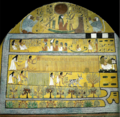Noble Truths, and the "summum bonum of Buddhism and goal of the Eightfold Path." In the Buddhist tradition, nirvana has commonly been interpreted as the...
147 KB (18,098 words) - 18:37, 21 November 2024
Jainism, nirvana is also the soteriological goal, representing the release of a soul from karmic bondage and samsara. In Buddhism, nirvana refers to...
49 KB (5,227 words) - 16:20, 18 November 2024
person attains nirvana, the "blowing out" of the desires and the gaining of true insight into impermanence and non-self reality. In Buddhism, saṃsāra is...
57 KB (6,547 words) - 08:06, 18 November 2024
Mahāyāna Mahāparinirvāṇa Sūtra (redirect from Nirvana Sutra)
important for the development of East Asian Buddhism. The Nirvana sutra uses the backdrop of the Buddha's final nirvana to discuss the nature of the Buddha,...
64 KB (8,348 words) - 02:27, 7 November 2024
These descriptions of nirvana in Buddhist texts, states Peter Harvey, are contested by scholars because nirvana in Buddhism is ultimately described...
246 KB (27,411 words) - 13:57, 21 November 2024
anatta. Insight leads to the four stages of enlightenment and Nirvana. In Mahayana Buddhism Prajna (Sanskrit) means "insight" or "wisdom", and entails insight...
43 KB (4,722 words) - 15:10, 18 October 2024
Parinirvana (section Final nirvana at death)
In Buddhism, parinirvana (Sanskrit: parinirvāṇa; Pali: parinibbāna) describes the state entered after death by someone who has attained nirvana during...
15 KB (1,649 words) - 21:32, 24 June 2024
Arhat (redirect from Lohan (Buddhism))
then be termed the nirvana element without residue remaining. Parinirvana occurs at the death of an arhat. In Theravada Buddhism, the Buddha himself...
28 KB (3,348 words) - 03:45, 1 November 2024
Nirvana may also refer to: Nirvana (Buddhism) Moksha (Jainism), the terms Nirvana and Moksha means same in Jainism Nirvana (leafhopper), a leafhopper genus...
4 KB (520 words) - 12:50, 20 November 2024
Four Noble Truths (redirect from Noble Truths of Buddhism)
the cessation of dukkha is nirvana, the summum bonum of Buddhism, and is attained in this life, not when one dies. Nirvana is "perfect freedom, peace...
158 KB (19,408 words) - 19:05, 21 November 2024
scriptures in Chinese Buddhism include: Lotus Sutra, Flower Ornament Sutra, Vimalakirtī Sutra, Nirvana Sutra, and Amitābha Sutra. Chinese Buddhism is the largest...
73 KB (7,978 words) - 02:46, 9 November 2024
following Shakyamuni Buddha's death and passing into Nirvana in East Asian Buddhism. The Three Ages of Buddhism are three divisions of time following Buddha's...
16 KB (1,894 words) - 22:42, 4 August 2024
Soteriology (redirect from Soteriology in Buddhism)
breaking free of samsara, the cycle of compulsory rebirth, by attaining nirvana. Buddhism emphasizes the importance of the individual's meditation practice...
21 KB (2,483 words) - 16:35, 4 November 2024
Mahayana (redirect from Mahāyāna Buddhism)
the Great Vehicle, one of the three main existing vehicles (yanas) of Buddhism. The Mahayana uses primarily the Sutra teachings of Buddhist philosophy...
150 KB (17,730 words) - 18:23, 14 November 2024
liberation may be called moksha, nirvana, or kaivalya; and in Buddhism it may be called vimoksha (Pali: vimokha), nirvana (Pali: nibbana) or bodhi (awakening)...
134 KB (17,213 words) - 22:51, 14 November 2024
liberation." In Thai Theravada Buddhism, for example, states Paul Williams, some modern era Buddhist scholars have said that "nirvana is indeed the true Self"...
30 KB (3,538 words) - 21:59, 11 November 2024
Pre-sectarian Buddhism, also called early Buddhism, the earliest Buddhism, original Buddhism, and primitive Buddhism, is Buddhism as theorized to have...
92 KB (11,707 words) - 16:58, 11 October 2024
Anicca is in contrast to nirvana, the reality that is nicca, or knows no change, decay or death. Anicca is understood in Buddhism as the first of the three...
9 KB (881 words) - 23:45, 14 November 2024
Anattā (section In early Buddhism)
Pursuing Nirvana? Archived 2015-02-06 at the Wayback Machine, Philosophy Now; David Loy (1982), "Enlightenment in Buddhism and Advaita Vedanta: Are Nirvana and...
85 KB (8,918 words) - 18:39, 3 November 2024
only if Nirvana (liberation) is achieved by insight and the extinguishing of craving. Rebirth is one of the foundational doctrines of Buddhism, along with...
92 KB (11,287 words) - 07:49, 3 October 2024
Saṃsāra (section In Buddhism)
cycle of existence, Nirvāṇa, is the foundation and the most important purpose of Buddhism. Saṃsāra is considered permanent in Buddhism, just like other Indian...
57 KB (6,234 words) - 02:21, 25 October 2024
Compatible With Pursuing Nirvana?, Philosophy Now; [e] David Loy (1982), Enlightenment in Buddhism and Advaita Vedanta: Are Nirvana and Moksha the Same?,...
32 KB (3,729 words) - 04:06, 17 September 2024
Southern Buddhism, Eastern Buddhism, and Northern Buddhism are geographical terms sometimes used to describe the three main schools of Buddhism (Theravāda...
12 KB (1,260 words) - 02:43, 7 September 2024
afterlife locations in Norse mythology Nirvana, concept of rebirth liberation in the Indian religions Nirvana (Buddhism) Neorxnawang, old Anglo-Saxon term...
8 KB (551 words) - 14:21, 14 November 2024
Theravada (redirect from Theravada Buddhism)
History of Nirvana, pp. 62, 75, 105. Routledge. Hwang, Soonil (2006), Metaphor and Literalism in Buddhism: The Doctrinal History of Nirvana, p. 72. Routledge...
146 KB (17,259 words) - 19:47, 19 November 2024
further study. Manichaeism was directly influenced by Buddhism. Like Buddha, Mani aimed for nirvana and used this word, showing the significance of Buddhist...
12 KB (1,404 words) - 01:49, 13 August 2023
cutting through all fetters, one attains nibbāna (Pali; Skt.: निर्वाण, nirvāṇa). Throughout the Pali canon, the word "fetter" is used to describe an intrapsychic...
28 KB (3,377 words) - 01:25, 7 November 2024
With Pursuing Nirvana? Archived 13 September 2017 at the Wayback Machine, Philosophy Now; [d] David Loy (1982), Enlightenment in Buddhism and Advaita Vedanta:...
25 KB (2,707 words) - 02:38, 7 November 2024
questioned how monasticism and personal attainment of Nirvana benefited the empire. However, Buddhism and Confucianism eventually reconciled after centuries...
25 KB (2,760 words) - 09:13, 20 November 2024


















